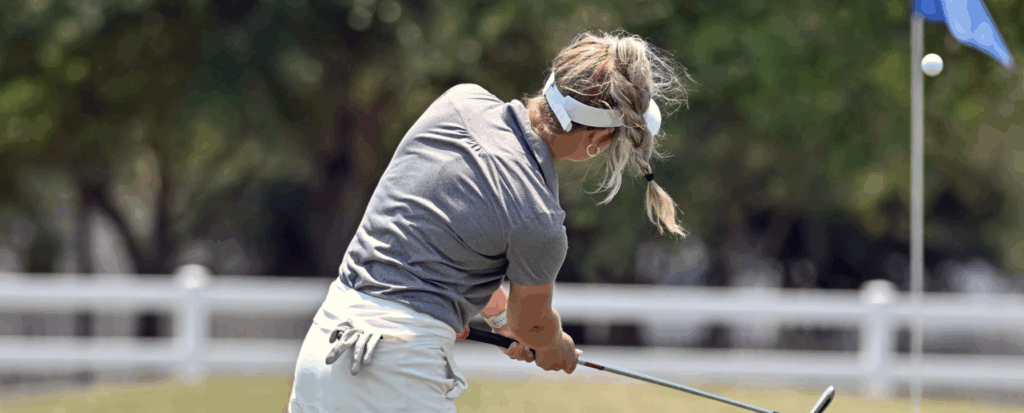By Rex Grayner, SVP of Business Development, Hurricane Junior Golf Tour

When two players post the same number, coaches don’t see a tie. They see habits.
Over the years I’ve watched plenty of rounds where the decision had little to do with clubhead speed or a pretty swing and everything to do with how a kid carried themselves when the round got bumpy.
As a parent, you can’t control pin placements or pairings. You can help your child build the traits that travel: calm after a mistake, respect for the group, steady effort when no one is keeping score. This article isn’t about swing tips or magic drills. It’s a clear look at the intangibles that separate similar scorers in a coach’s mind, and a simple checklist you can use this weekend to reinforce them.
Composure: How You Respond When It’s Not Going Your Way
Every college coach has their own version of a “tough round test.” It’s not a formal thing. They just notice what happens when a player faces adversity. Do they unravel after one bad hole? Do they stay composed and find a way to save something respectable?
In tournament golf, everyone’s going to make doubles, lip out short putts, and get bad bounces. Coaches expect it. What they pay attention to is how long it takes to recover.
I’ve seen kids who play flawless golf until one swing gets away from them, and suddenly the body language shifts. Shoulders drop. Pace slows. Focus slips. You can almost see the story they’re telling themselves, and it usually isn’t helpful. Then you’ll see another player quietly mark their ball, take a breath, and go back to work. Same bad break, completely different impression.
That moment speaks volumes to a coach. It tells them how a player will handle a qualifying round, a travel week, or a bad start to a college event. And it tells them whether they can trust that player to represent the program with maturity.
The takeaway for families is simple: emotional control is a skill. You can model it at home and reinforce it on the course. It starts with learning to separate result from response. A poor shot isn’t the problem. Staying in it mentally is what coaches remember.
Energy: What You Bring to the Group
Golf is an individual sport, but college golf is not. The best programs are built on chemistry, accountability, and culture. And coaches are constantly scanning for players who make the people around them better.
That doesn’t mean you have to be the loud motivator or the comic relief. It means you carry yourself in a way that shows respect for everyone sharing the fairway. Coaches notice when a player compliments a good shot, thanks the volunteers, or helps spot a lost ball. They also notice when someone rolls their eyes at a ruling or checks out when things aren’t going well.
Parents sometimes underestimate how much that energy matters. You can shoot the same score as another kid and still be remembered as the one who handled themselves with professionalism.
Coaches aren’t just recruiting scores. They’re recruiting teammates. They want players who will add to their culture, not drain it.
So when your child tees it up, talk less about “going low” and more about bringing good energy. It’s a subtle shift, but it reinforces values that travel farther than any single round ever will.
Effort: The Unseen Work That Builds Trust
Here’s something coaches rarely say out loud but almost all believe: they don’t need to watch you hit every shot to know who works hard. Effort shows up in small, consistent ways.
It’s how early you arrive for your tee time. How much attention you pay to pre-round prep. Whether you give your full focus to every putt, even late in the day when you’re tired.
I’ve walked events where a coach’s notes after a round said, “not great score, but plays with purpose.” That’s code for: this kid competes the right way.
Effort doesn’t mean over-practicing or chasing perfection. It means taking ownership of your process. For parents, it’s helping your child understand that a strong work ethic is visible. A coach watching a practice round can tell who’s out there just to check a box and who’s truly trying to learn something.
And when coaches talk about “grit,” this is what they mean. It’s not a slogan. It’s how you behave when no one’s keeping score.
The Little Things That Add Up
If you talk to enough college coaches, you’ll hear the same theme: they look for patterns. No single act defines a player, but consistent habits paint a picture.
Here are a few habits that stand out for the right reasons:
- Finishing strong: Body language stays steady whether it’s 68 or 78.
- Showing gratitude: Thanking playing partners and staff isn’t a small thing.
- Keeping perspective: Talking about learning instead of complaining about results.
- Staying ready: Knowing your yardages, pace, and plan.
- Respecting the game: Dressing sharp, fixing ball marks, leaving things better than you found them.
These aren’t advanced skills. They’re reflections of maturity. And when a coach has two players on their board with similar stats, these are often the tiebreakers.
A Coach’s Perspective
The truth is, college coaches expect a lot. They want consistency, leadership, and resilience, all before a player ever sets foot on campus. But they also know those qualities can’t be faked for long.
That’s why intangibles carry so much weight. A player who stays even-keeled, who listens, who doesn’t let emotions dictate their round… that’s someone a coach can build a team around.
Parents often ask, “What should my child do to stand out?” My answer rarely changes: focus less on what to say, and more on how you act when it’s hard. Scores fluctuate. Character travels.
Closing Thought
College golf recruiting isn’t a beauty contest. It’s a trust exercise. Coaches are constantly asking themselves, “Can I rely on this player when things get tough?”
Your child doesn’t have to be perfect to earn that trust. They just have to be consistent. The way they react to a bad hole, the effort they show in warm-up, the respect they give to others… those details tell a story that stats alone can’t.
If you want your junior golfer to keep building those habits in real competition, explore upcoming HJGT tournaments. Each one is a chance to test the intangibles that matter most.




